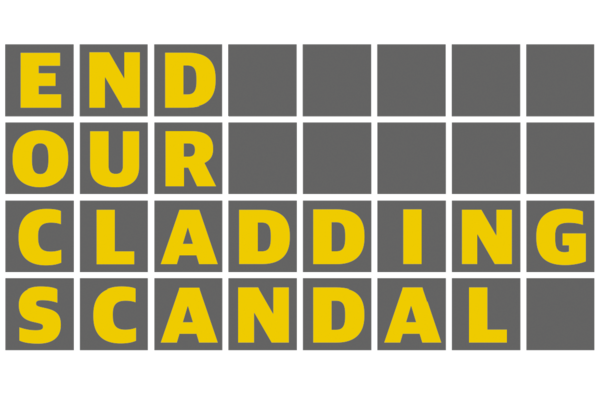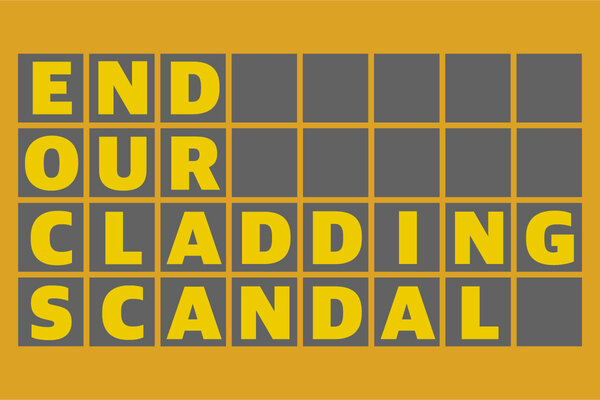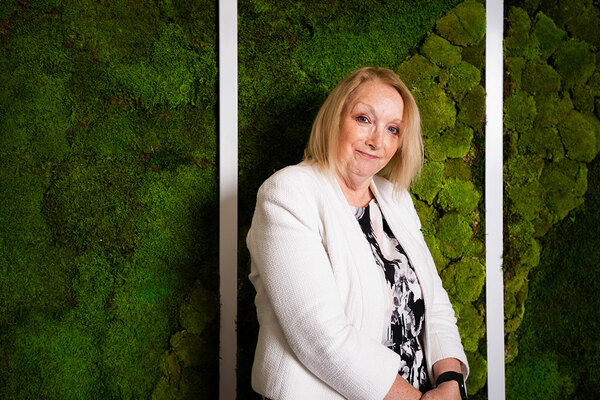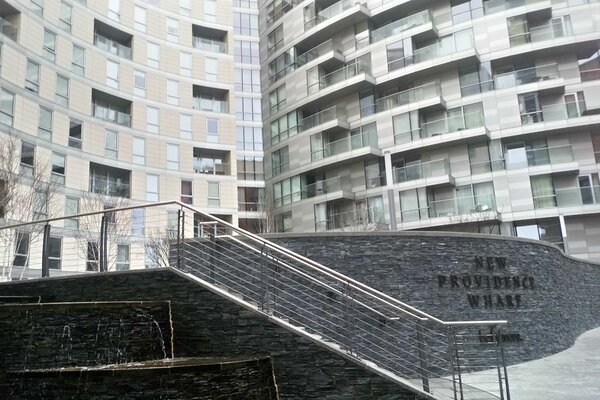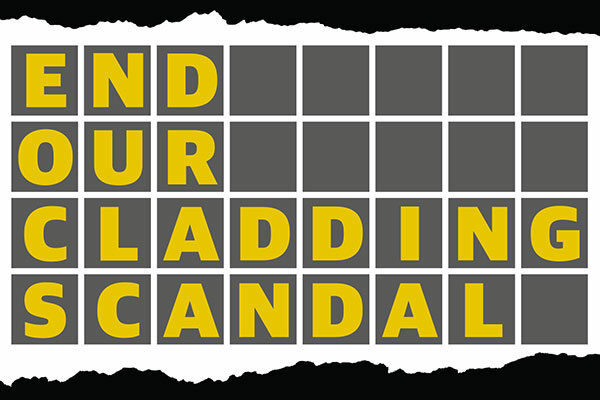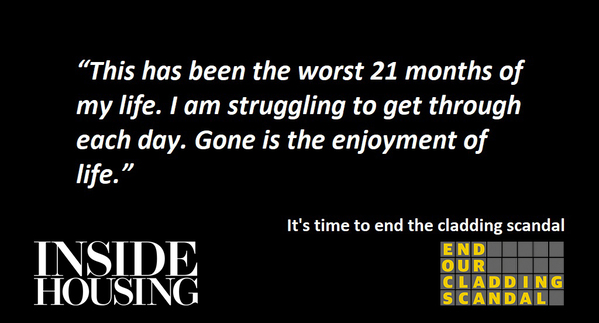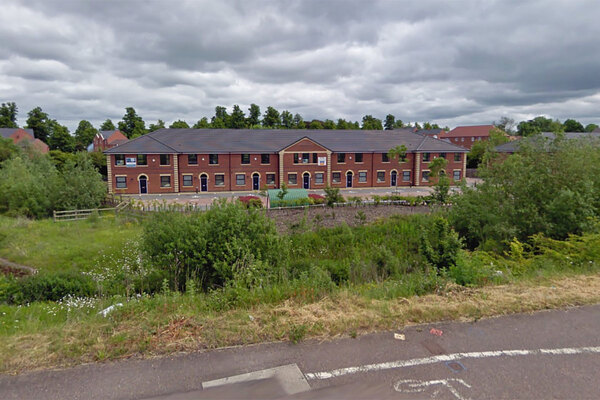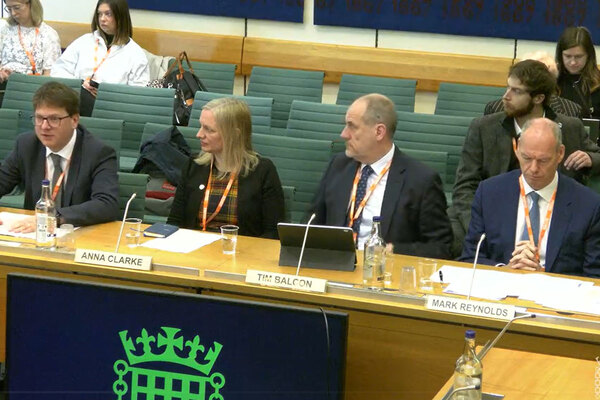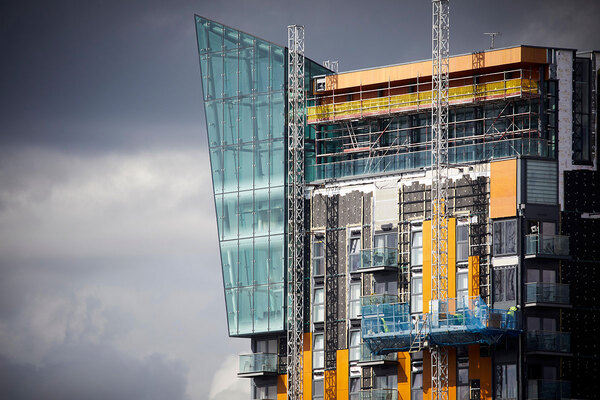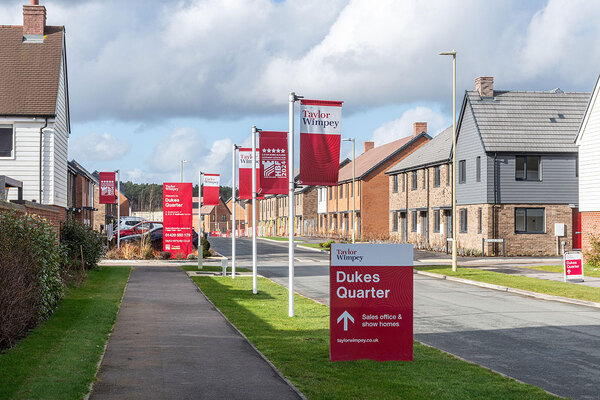Revealed: the mental health trauma of residents in private blocks with dangerous cladding
A survey of private tower block residents has shown a deeply worrying trend of depression, anxiety and suicidal thoughts, as flammable cladding remains attached to their buildings. Peter Apps reports
Hannah (not her real name) was a first-time buyer when she purchased her central Manchester flat three years ago. It was supposed to be the start of a dream – the first step on the housing ladder for a young woman ready to embark on her career and her life.
Instead it has turned into a nightmare. After the Grenfell Tower fire, the block was identified as one of 176 private residential towers with dangerous aluminium composite cladding. It needed to be removed to make the building safe. But the building’s managers quickly made it clear that it was the residents who would be footing the bill.
In February this year, these bills landed. An invoice fell through Hannah’s letterbox demanding £19,200.
“There was no payment plan, no explanation of how long we had to pay, nothing,” she tells Inside Housing. “There was just the bill.”
Since then she has been plagued by financial stress – a never-ending worry and anxiety that she is on the verge of losing her home and all her savings.
Hannah is not alone. As of March, private residential buildings containing 17,400 flats were still wrapped in Grenfell-style cladding. Some have seen the developers or owners of their blocks promise to cover the cost, under pressure from government.
But many have not. It is estimated that around 10,000 residents face the same impossible choice Hannah does – financial ruin or life in a building which is known to be unsafe. And this is taking its toll.
This week Inside Housing can reveal the results of an exclusive survey into the mental health impact on residents of these blocks. It comes as we launch our new campaign End Our Cladding Scandal, which joins forces with the grassroots group of impacted leaseholders, the UK Cladding Action Group (UKCAG) and residents of affected blocks in Manchester, call for the government to take the steps necessary to end this crisis. We are calling for a fund to be established to pay for remediation work to be completed within two years.
The survey, carried out by UKCAG and sent to affected private blocks up and down the country, was answered by 196 leaseholders and tenants in 21 affected blocks across 10 councils.
The findings are hugely worrying (see box). A shocking 64.8% of respondents said their mental health had been “hugely affected” by the situation, with 87.8% saying their mental health was worse now than it was before the cladding was discovered.
“It has been the worst 21 months of my life. I am struggling to get through each day. Gone is the enjoyment of life”
Meanwhile, 69.5% said they feel anxious or worried about the future on a daily basis, 81.6% had experienced stress, 77.6% anxiety, 65.8% difficulty sleeping, and 23% had fallen into depression. A third have sought medical help for these problems and, terrifyingly, 8.7% have experienced suicidal thoughts as a direct result of the ongoing problems.
End Our Cladding Scandal: the mental health crisis in numbers
64.8% of residents say their mental health has been "hugely affected" by the ongoing crisis in their blocks
77.8% have experienced anxiety as a direct result of the crisis, while 23% have experienced depression and 65.8% have had difficulty sleeping
8.7% have experienced suicidal thoughts as a direct result of the cladding issues
66.3% have been told by surveyors that they cannot sell the properties
28.1% have been diagnosed with a health issue by a medical professional
86.2% have seen service charges go up, with 25% saying more than £200,000 has been spent on their blocks
25% feel they cannot start a family as a result of the issues
Source: UKCAG survey of 196 affected leaseholders and tenants in private blocks affected by cladding issues
Given the chance to respond, the testimonies were stark. “It has been the worst 21 months of my life. I am struggling to get through each day. Gone is the enjoyment of life,” wrote one.
“The effects of the uncertainty are unimaginable unless you’re in the situation yourself. I wish more than anything I hadn’t worked hard to save for and buy a property ever,” added another. “I feel constantly stressed, anxious, depressed, lost, abandoned and devastated.”
“My previously rare-to-intermittent insomnia is now regular and persistent, leading to exhaustion and depression, in turn rendering me unable to work properly much of the time. This has given rise to further money worries and put me into a downward spiral of depression,” said another.
Another simply added: “I feel hopeless.”
Other leaseholders refer to losing long-term relationships due to the stress. Plans to start families have been placed on hold, marriages delayed and people have been forced to sign off work as the uncertainty over the cladding rumbles on.
One of the key problems is the difficulty selling these flats, which makes the situation virtually inescapable. Due to the ongoing cladding issue, valuers have priced flats at a tiny fraction of their original price. Those who used their savings to pay for a mortgage on a property, which is now worthless, cannot afford to sell and move, and will not be able to until the cladding is removed. In total, 66.3% have been told by surveyors that they cannot sell the property. They are stuck.
Respondents to the survey include a family expecting a child, who will now have to raise it in a flat which is too small for their needs, and with flammable cladding attached to the outside. Another had planned to sell and move to Italy with her boyfriend. In the end, he has had to go without her.
“Overall health has deteriorated as I no longer see the point in a lot of things including staying fit and healthy”
“My life is on hold until this is resolved,” said one leaseholder.
Physical health has also suffered. More than half (55.1%) of respondents stated that their physical health is worse now than it was before. Almost a third (28.1%) said they had received a formal diagnosis from a health professional as a direct result. Diagnosed conditions included headaches or migraines, heart disease (including high blood pressure), gastrointestinal problems (such as IBS), skin conditions (such as psoriasis), shingles and diabetes.
“Overall health has deteriorated as I no longer see the point in a lot of things including staying fit and healthy,” said one respondent.
“I suffer from an auto immune condition. Stress and working long hours can make the symptoms worse,” added another.
The money worries are also not limited to forthcoming bills for removal. Despite repeated pledges from ministers that leaseholders will not have to pay for the crisis, 86.2% of respondents said their service charges had gone up. In a quarter of cases more than £200,000 has been spent.
This money has covered measures such as fire alarms to better protect the building and in many cases the cost of a full-time ‘waking watch’ engaged to patrol corridors on the lookout for fire. In at least one case, these costs have become so prohibitive that residents are doing the work themselves – working full-time jobs then taking a shift marching the corridors between 7pm and midnight, before handing over to another resident to carry on until dawn.
“This cladding issue has taken up any spare time of my life,” writes one respondent.
End Our Cladding Scandal: campaign aims
- Government provides a fund to cover the cost of cladding removal and remedial works on private blocks
- A firm timescale is set out of no more than two years for the work to be carried out
- Residents are reimbursed for the interim fire safety costs incurred, and funding is to be provided for necessary internal fire safety measures identified by a competent fire risk assessor
These financial pressures have had knock-on effects beyond the stress – 25% said they felt they cannot start a family, 30.1% have had to seek financial help from family and friends, 10.7% have had to take a loan out to cover increased costs, and 5.6% said they had been forced to remain in an unhappy relationship because they are unable to sell. Others have taken second jobs or burned through pensions.
As we have explained elsewhere in this week’s edition, the government’s attempts to solve the problem have hit an impasse. The first strategy was to persuade freeholders or developers to pay. Despite some success as bigger-name builders were embarrassed or cajoled into stumping up the cash, this approach has reached its limits. There is no incentive for the firms which are still refusing to reverse their decision – tribunals have ruled against the residents and as the media lens turns away from Grenfell-related stories, the worst of the reputational damage has passed.
“I genuinely believe nothing will be done until we have a second tragedy in a private block”
Similarly, an attempt to give councils the power to force this work to go ahead has fallen flat. Leaving to one side the difficulty of enforcing them, the new powers contain no mechanism to protect leaseholders from the costs. Serving notice on a freeholder will simply result in them upping the ante on leaseholders to pay. A new approach is urgently needed.
Responding to our campaign, James Brokenshire, communities secretary, said he "fully recognises the anguish" faced by residents of these blocks and said the government is "looking at a range of new additional measures to get building owners to do the right thing and get on with it".
But almost two years on from Grenfell, the time for simply looking at measures has long passed. Residents want to see action. In fact, the feeling of frustration at the lack of answers from the state has clearly added to the mental health burden which these residents have experienced.
“The stress and anxiety are unnecessary because the government can and should step in,” writes one leaseholder.
This has been done in the social housing sector, but the private residents have been left to fend for themselves.
“I genuinely believe nothing will be done until we have a second tragedy in a private block,” writes one respondent to the survey.
A second tragedy is the outcome everyone involved in housing pledged to avoid after Grenfell. For the sake of the thousands of people affected, it is time to come good on that promise.
- Martin Hilditch, editor, Inside Housing
- Manchester Cladiators
- UK Cladding Action Group
- Natasha Elcock, chair, Grenfell United
- Sadiq Khan, mayor of London
- Kate Henderson, chief executive, National Housing Federation
- Terrie Alafat, chief executive, Chartered Institute of Housing
- Andy Burnham, Mayor of Greater Manchester
- Lord Gary Porter, chair of the Local Government Association
- Polly Neate, chief executive, Shelter
- Jane Duncan, chair of the expert advisory group on fire safety, RIBA
- Andy Dark, assistant general secretary of the Fire Brigades Union
- Christina McAnea, assistant general secretary, UNISON
- Sir Peter Bottomley, Conservative MP and chair of the All-Party Parliamentary Group on Leasehold and Commonhold Reform
- Jim Fitzpatrick, Labour MP, and member of All-Party Parliamentary Group on Leasehold and Commonhold Reform
- Mark Amesbury, shadow employment minister and Labour MP for Weaver Vale
- Emma Dent Coad, former Labour MP for North Kensington
- Lucy Powell, Labour MP for Manchester Central
- Rushanara Ali, Labour MP for Bethnal Green and Bow
- George Howarth, Labour MP for Knowsley
- Graham Stringer, Labour MP for Blackley and Broughton
- Rob Ellis, presenter, Capital FM
- John Biggs, mayor of Tower Hamlets
- Paul Dennett, mayor of Salford
- Suzanne Richards, councillor and executive member for housing and regeneration on behalf of all Manchester's Labour Councillors
- Sir Richard Leese, Labour councillor and leader Manchester City Council
- John Leech, Manchester Liberal Democrat leader on behalf of all Manchester’s Liberal Democrat councillors
- Darren Rodwell, executive member for housing at London Councils and leader of Barking and Dagenham Council
- George Clarke, TV Architect
- David Walker, bishop of Manchester
- Graham Tomlin, bishop of Kensington
- John Roberts, founder of AO.com
- Josh Beaumont, professional rugby player, Sale Sharks and resident of affected building
- Bill Beaumont, former England rugby captain
- Jeremy Dyson, co-founder of the League of Gentlemen
- Andy Moss, actor who has appeared on Channel 4’s Hollyoaks and resident
- Ross Mullan, actor who has appeared in Game of Thrones
- Get Cape Wear Cape Fly, musician
- Nour-eddine Aboudihaj, spokesperson for Justice4Grenfell
- Mike Leonard, chief executive, Building Alliance
- Kate Kendrick, founder, National Leasehold Campaign
- Martin Boyd, chair, Leasehold Knowledge Partnership
- Paula Higgins, chief executive, HomeOwners Alliance
- Mark Henderson, chief executive, Home Group
- Ben Clay, founding member of the Tenants Union
- Hilda Palmer, acting chair of the Hazards Campaign
- Susan Bright, professor of law, University of Oxford
- Gill Kernick, consultant and former Grenfell Resident
- Phil Murphy, fire safety expert and tower block resident
This list will be updated. Please email peter.apps@insidehousing.co.uk if you want to support the campaign
End Our Cladding Scandal: full coverage
- Government-funded advice agency tells leaseholders they are 'likely' to be liable for cladding costs: LEASE, the government's official advisory service for leaseholders, has been advising residents they are likely to be liable to pay bills for cladding removal
- Residents evacuated after fire at block with Grenfell-style cladding: Residents of Vallea Court in Manchester are forced to flee after a fire breaks out in a lift shaft
- Leaseholders in London block pay nearly £3.5m for cladding removal: Despite promises from ministers to protect leaseholders, residents of the M&M Buildings near Paddington have been told to pay out
- Minister's will have blood on their hands if another death occurs, says MP: A round-up of the parliamentary debate on providing funding to remove dangerous cladding
- Sector leaders call for an end to the cladding scandal: backers of the campaign explain why they are calling on the government to end the scandal
- #EndOurCladdingScandal – campaign launch sees cladding stories go viral: a round-up of the Twitter reaction to the launch of our campaign
- Revealed: the mental health trauma of residents in blocks with dangerous cladding: read about the mental health impacts of dangerous cladding on high rises
- Victims of the cladding scandal: read the stories of some of those impacted by the crisis
- Why we need a cladding fund for private buildings: Manchester Council chief executive Joanne Roney explains why a fund to pay for cladding removal is necessary
- Why Inside Housing is joining with leaseholders to call for an end to the cladding scandal: our deputy editor Peter Apps on why we are supporting the campaign
- End our cladding scandal: the campaign’s aims and backers
Use our graphics to show your support for End Our Cladding Scandal
Click the links below to download images to use on social media (like the one above) to promote End Our Cladding Scandal
End our Cladding Campaign logo for Twitter
Note: If your browser does not allow you to download the image, simply right click on the graphic and click ‘save image as’ instead.

